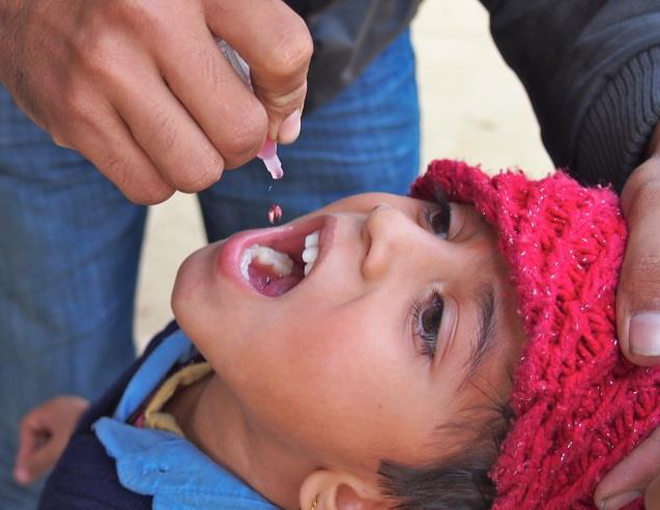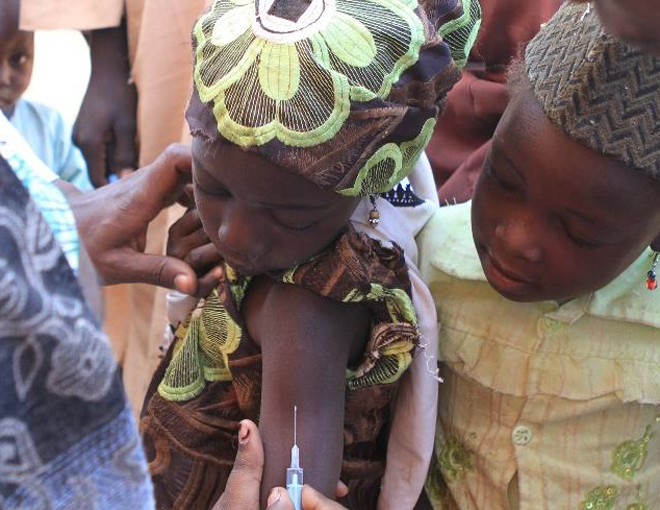Global Polio Eradication: Reaching Every Last Child
Presented on .
Polio is a crippling and potentially deadly infectious disease. The virus spreads from person to person and can invade an infected person’s spinal cord, causing life-long paralysis or in rare instances, death. The eradication of polio remains an important priority for the CDC and many of its global partners. Over the past 25 years, the number of polio cases reported worldwide has fallen from an estimated 350,000 in 1988 to only 407 in 2013—a decline of more than 99%, but there remains work to be done.
Currently, four regions of the world (the Americas, Europe, South East Asia and the Western Pacific) are certified polio free, but in a small number of countries the spread of this disease has never stopped, putting all the countries of the world at risk. Polio has no cure, making vaccination the only way to eradicate it. However, continued conflict, political instability, hard-to-reach populations, and attempts to ban vaccination in some areas continue to pose complex challenges and threaten to derail decades of work.
In this session of Grand Rounds we investigated the efforts of those fighting against polio. Specifically, this session highlights innovative strategies being used in countries affected by insecurity to accelerate immunization and surveillance efforts to ultimately reach every last child and make the world polio free.
Dr. Phoebe Thorpe and Dr. Elias Durry discuss the challenges in eradicating polio worldwide. Reaching every last child and making the world polio free is possible, but everyone has to do their part.
- Public health agencies must continue to strengthen surveillance systems and immunization programs
- Governments must support the efforts of vaccinators by ensuring safe environments to work.
- Community leaders must partner with vaccinators to educate their communities.
- Gregory L. Armstrong, MD
- Chief, Polio Eradication Branch, Global Immunization Division
Center for Global Health, CDC
- M. Steven Oberste, PhD
- Chief, Polio and Picornavirus Laboratory Branch, Division of Viral Diseases
National Center for Immunization and Respiratory Diseases, CDC
- Faisal Shuaib, MD, DrPH
- Deputy Incident Manager for Polio
Polio Emergency Operations Center
- Elias Durry, MD, MPH
- Senior Emergency Coordinator for Polio Eradication in Pakistan,
Eastern Mediterranean Regional Office
World Health Organization
- John Iskander, MD, MPH
- Scientific Director
- Phoebe Thorpe, MD, MPH
- Deputy Scientific Director
- Susan Laird, MSN, RN
- Communications Director
Get notified about the latest updates from Public Health Grand Rounds right in your inbox by setting up an alert today!
Get notified about the latest updates from Public Health Grand Rounds right in your inbox by setting up an alert today!Sign Up
Get notified about the latest updates from Public Health Grand Rounds right in your inbox by setting up an alert today!

The polio crisis has been largely forgotten in the US due to the Salk vaccine and the effective immunization campaigns of the 1950s. Unfortunately, the wild poliovirus still remains a real public health threat in many corners of the world. Learn about current efforts to contain polio in India and globally.

Measles is a highly contagious virus that spreads through the air when an infected person coughs or sneezes. The virus can cause serious health complications. Hear how increased focus on field and laboratory surveillance, and innovative vaccination solutions can accelerate the elimination of measles worldwide.
